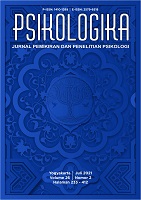Main Article Content
Abstract
The concept of wisdom as one of the strengths of human character has been widely studied, both in terms of theoretical concepts and measurements. ISM-AV is the development of a theory-based wisdom measurement instrument from Muslim scholars ibn Miskawaih (2011). The existence of this instrument becomes a necessity to know the extent to which a person assesses his balance in using his mind to produce good actions/attitudes, in an academic context. This study was to validate ISW-AV using external criteria, namely SD-WISE, and PAPI-Kostick (only used aspects: leadership role), need to control others, ease in making decisions, and the theoretical type of thinking. The content validity process involving eight qualified panelists has guaranteed that the items used on this scale are most relevant (CVI > .80). The results of the second study involving 125 student respondents, found that the ISW-AV had similar constructs to the standard wisdom scale (SD-WISE) (r = .550, p =?). Furthermore, the results of the third study involving 666 students found that ISW-AV was positively correlated with leadership roles (r = .261), the need to control others (r = .232), and ease in decision making (r = .114), but negatively correlated with the theoretical type (r = -.117). This finding shows that wisdom is not the same as theoretical intelligence, it is closer to social leadership skills. In conclusion, this scale can be used for further research purposes. For the development of this scale, the process of normalizing and compiling a short form will be very useful to complement the features
Article Details
License
Authors who publish with this journal agree to the following terms:
- Authors retain copyright and grant the journal right of first publication with the work simultaneously licensed under a Creative Commons Attribution-ShareAlike 4.0 International License that allows others to share the work with an acknowledgment of the work's authorship and initial publication in this journal.
- Authors are able to enter into separate, additional contractual arrangements for the non-exclusive distribution of the journal's published version of the work (e.g., post it to an institutional repository or publish it in a book), with an acknowledgment of its initial publication in this journal.
- Authors are permitted and encouraged to post their work online (e.g., in institutional repositories or on their website) prior to and during the submission process, as it can lead to productive exchanges, as well as earlier and greater citation of published work (See The Effect of Open Access).




